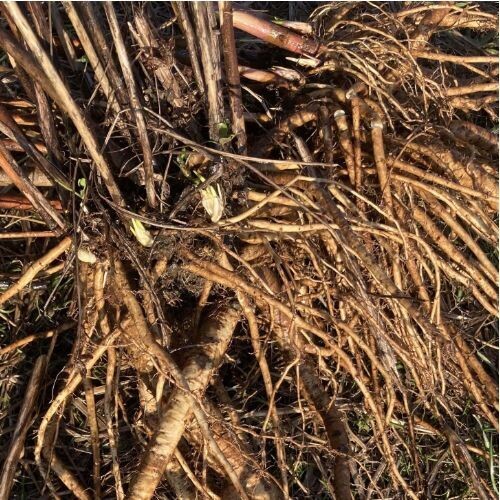ESTABLISHED 2006
Over 50,000 Orders Shipped
NEXT DAY UK DELIVERY
Worldwide Shipping 3-5 Days
SUBSCRIPTIONS
Subscribe & Save!
RATED ★ ★ ★ ★ ★
1100+ 5* Reviews
MARSHMALLOW Root (Althea officinalis)
Please note this is a nutritional, functional horse food supplement and not veterinary medicine. See Dr Kellon's Horse Sense - 'Nutrition is not 'Alternative' Therapy.
Tincture
Our human-grade, certified organic tinctures give you a ready-to-absorb potent source of phytonutrients at the highest-strength available, for immediate absorption straight into the bloodstream and to the body’s cells.
~ 100% certified organic pure tincture
Althea officinalis Radix (Marshmallow) Root, Cold Macerated 1:3 35%, Organic Cultivated
~ Feed Guide
- 6ml/100kg bodyweight, daily in feed.
- Always shake the bottle to disperse any sediment.
- 3-year shelf-life.
Dried Herb
Produced to ecological standards and free from agro-chemicals.
~ Certified organic dried herb
Althea officinalis (Marshmallow) Root , Cut, Wild Harvested , Origin Albania
~ Feed Guide
- 5g/100kg bodyweight per day, thus for an average 500kg horse add 25g daily to feed.
- 1-year shelf-life.
Functional Nutritional Value
Constituents: Mucilage, starch, pectin, flavonoids, phenolic acids, sucrose, asparagine, tannins.
NB. Our range of botanicals are all grown, harvested and dried without the use of agri-chemicals, non-irradiated and GMO free - see our Quality page for Quality Management & Certification Documents. Laboratory tested for identification and compliance to the British and European Pharmacopoeia standards, and are human grade. Please be aware that if you're purchasing our dried botanicals for human use, our dried range is cut to appropriate sizes for feeding to horses.
More ...
Did you know that the actual marshmallow plant (mallow family) was the foundation for the original marshmallow sweet? The connection's easy to see as it personifies softness; its leaves and broad flower petals are soft and velvety, and its root releases slippery soft mucilage when steeped in water - in fact, the entire plant is full of mucilage. Marshmallow has been soothing the world for thousands of years, so much so that Culpeper said in 1653, “Common mallows are generally so well known that they need no description.”
The records show the use of marshmallow as food and medicine date back to the ancients of Greece, Egypt, Middle East, and Rome, with the physician Pliny proclaiming that “ whosoever shall take a spoonful of the mallows shall that day be free from all diseases that may come to him. ” Theophrastus (372-286 BCE) also mentions in his writings that marshmallow root was combined in wine to address coughs.
Traditional and early uses are the same as what us modern-day users still take marshmallow for - an internal demulcent treatment for the mucus membranes - sore throats and respiratory tract soothing, and gastrointestinal discomfort. Cooling, soft, gooey and moist, marshmallow was noted by Culpeper to help with “all hot and sharp diseases” and “opening the strait passages, and making them slippery”. In 1919, Dr. Ellingwood described marshmallow as having a soothing influence on the intestines, helpful for inflammation and irritation of the GI tract as well as the bladder.
Marshmallow is demulcent, diuretic, anti-inflammatory, expectorant, and emollient, with the root higher in mucilage than the leaves so it’s more indicated for the gut mucosa; the leaf is more appropriate for respiratory issues.
These days, marshmallow is used primarily only by herbalists for its phytonutrient benefits.e. However, it was once a food staple for the ancients, with the root high in calcium and an excellent source of trace minerals including chromium, iron, magnesium and selenium.
Overall, marshmallow is a lovely friendly plant with soft leaves and a beautiful silky flower, and is perfect to grow anywhere where there’s damp soil.
Safety
- In theory, marshmallow's high mucilage levels may inhibit absorption of drugs taken simultaneously.
The EquiNatural Blog

Menu
Get in Touch
+44 01761 325032
mail@equinatural.co.uk
Unit 4 Rookery Farm, Radstock, BA3 4UL
Terms & Conditions
Privacy Policy
Legal Notice
Stay Connected
Subscribe to our emails for the latest insights, updates, tips, and offers.
Contact us
Thank You for Joining Us!
We’re so pleased to welcome you to the EquiNatural community. Keep an eye on your inbox for updates, tips, and exclusive offers to help your horse thrive naturally.
Warm wishes
The EquiNatural Team
Please try again later
Any information contained within is not intended to replace veterinary or other professional advice.
*
Trading Standards EC Feed Hygiene Regulation (183/2005), Registration No. GB280/4203
* HACCP certified facility (an international standard that ensures we meet food safety standards)
* Registered in England. Company Number 11075894 - Reg'd Office: Unit 10 Rookery Farm, Radstock BA3 4UL
* VAT No. GB 310214964




